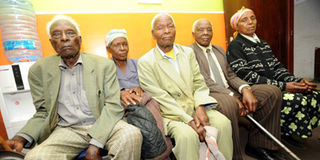Why the Mau Mau case ruffled Britain

PHOTO | FILE Officials of the Mau Mau War Veterans Association at a recent press conference.
What you need to know:
- It was expected that the case would have ultimately attracted about 10,000 Kenyans who claim to have been tortured during the colonial era.
- Mr Nzili recounted how he was castrated in September 1957 using a burdizzo, which is primarily used to castrate bulls, at a detention camp in Embakasi.
The need to forestall embarrassment arising from the damning evidence Mau Mau veterans would have adduced at full trial may have pushed the British government to seek an out-of-court settlement over the matter.
Also, if compensation had been formally sanctioned by the courts, Britain feared this could have opened the floodgates to claims from other former colonies.
The verdict in the case would have been cited as established jurisprudence by the complainants, in pursuit of judgment against the UK government.
Last week, the Guardian newspaper reported that the British government had entered into talks with the veterans for an out-of-court settlement.
The paper said the Foreign Office chose the out-of-court settlement after suffering “a series of defeats in their attempts to prevent elderly survivors of the prison camps from seeking redress through the British courts”.
The statements of the three elderly ex-Mau Mau claimants who won the right to sue the British government, reveal untold stories of cruelty by the colonialists and perhaps the reason why the Foreign Office has been fighting tooth and nail to have the case halted.
It was expected that the case would have ultimately attracted about 10,000 Kenyans who claim to have been tortured during the colonial era.
This would have offered an opportunity for even more gory evidence to be presented, which would have left the British government in an awkward position, considering its current position as an ardent human rights crusader.
In addition, the court would have accessed a secret archive of more than 2,000 boxes containing 8,800 files from 37 former colonies, among them Kenya, which had been brought back from these former colonies when they became independent.
During the successful case on whether the elderly Kenyan victims could sue Britain for the crimes committed 50 years ago, the petitioners provided stomach-churning accounts of torture.
The British government was, however, saved by the complainants’ inability to speak any other language other than Kikuyu.
This meant that they had their evidence translated and put down for the judge to read. The evidence was consequently available virtually to the judge alone and interested media outlets. The three complainants -— Paul Muoka Nzili, Jane Muthoni Mara and Wambugu Wanyingi — appeared at the Royal Court of Justice in London last July as a formality because their evidence had already been taken.
Mr Nzili recounted how he was castrated in September 1957 using a burdizzo, which is primarily used to castrate bulls, at a detention camp in Embakasi.
He recalled being stripped naked by the camp’s commander, a white settler called Mr Dunman but nicknamed Mr Luvai, which means merciless or harsh person in the Kamba language.
“Mr Luvai approached me with large pair of pliers (burdizzo) which were more than a foot long and castrated me,” he said. “It took me years to find any hope but I have never really recovered from what was done to me.”
Ms Muthoni, of Ndia in Embu, told the judge how she was arrested in July 1954 and taken to a screening camp aged just 15.
Upon arrival at the camp, they were ordered to sit down and stretch their feet.
The District Officer, a white man nicknamed Mr Waikanja by the prisoners, walked on their legs and those who screamed were clobbered by a home guard called Edward Gakuha, who was also walking over the prisoners’ legs. On her second day at the camp, two guards held her arms while another prised open and held her legs apart.
Mr Nyingi narrated to the judge how British forces arrested him on December 24, 1952 led by a home guard called Kiririo Wambugu, who was his neighbour in Githiru village in Tetu, Nyeri.
“As a reward for betraying me he was given the land I owned which he has occupied to this day,” said Mr Nyingi.
He then narrated how he was locked up in a room with 200 other men, which forced them to spend the nights standing. The rooms lacked toilets.
He says that at one point, he spent two nights in a dingy room with 11 corpses.




